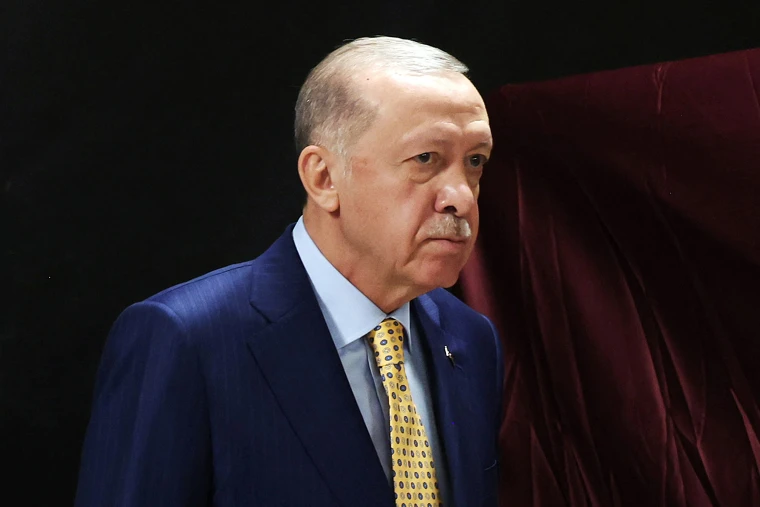ISTANBUL – In a nationwide local vote on Sunday, Turks delivered President Tayyip Erdogan and his party their heaviest electoral setback, reinforcing Istanbul Mayor Ekrem Imamoglu as the president’s main opponent and reaffirming the opposition’s political power.
The Republican People’s Party (CHP) of Imamoglu retained Ankara and gained 15 additional mayoral seats across the country as of the majority of the votes being counted. Imamoglu was leading by ten percentage points in the mayoral contest in Istanbul, the largest city in Turkey.
It was the biggest setback for Erdogan and the AK Party (AKP) in their more than 20 years in office, and it may herald a shift in the divisive political climate of the nation. Erdogan described it as a “turning point” in a speech just after midnight.

Due to rising prices, disgruntled Islamist voters, and Imamoglu’s popularity outside of the CHP’s secular heartland in Istanbul, he and the AKP performed worse than pollsters had projected, according to observers.
“Those who do not comprehend the message of the nation will ultimately lose,” the 53-year-old Imamoglu declared late on Sunday to thousands of ecstatic followers, some of whom were yelling for Erdogan to step down.
“Tonight, sixteen million citizens of Istanbul sent a message to our opponents and the president,” declared the former businessman, who entered politics in 2008 and is currently being predicted to run for president.
Erdogan, who served as mayor of Istanbul, his hometown, in the 1990s, had run a vigorous campaign ahead of the municipal elections, which observers saw as a barometer of the opposition’s and his own support.
Erdogan said his coalition had “lost altitude” across the country and that it will take action to address the message from voters as he spoke to large crowds at the AKP headquarters in the capital city of Ankara.
He declared, “If we made a mistake, we will fix it” going forward. “If we have anything missing, we will complete it.”
Another setback for Erdogan came when hundreds more supporters in Ankara waved party and Turkish flags during a speech by the reelected CHP mayor, Mansur Yavas, who easily defeated his AKP opponent.
The largest city in Europe and the center of the nation’s economy, Istanbul, had 92.92% of its voting boxes opened, indicating that 50.92% of voters supported Imamoglu, while 40.05% supported AKP rival Murat Kurum, a former minister in Erdogan’s national administration.
Surveys had indicated that the race in Istanbul would be close and that the CHP might lose ground nationwide.
However, preliminary official results released by the state-run Anadolu Agency revealed that the AKP and its principal ally had forfeited mayoralty in 19 significant municipalities, including the industrialized northwest’s major cities Bursa and Balikesir, potentially indicating financial difficulties on wage earners.
The results showed that the CHP was leading the country by nearly 1% of the vote, a first in thirty-five years.
As an assistant professor of political science at Bogazici University in Istanbul, Mert Arslanalp declared that this was Erdogan’s “severest election defeat” since he took office in 2002.
When Imamoglu first won Istanbul in 2019, he delivered Erdogan a severe electoral setback and put a stop to the 25 years that the AKP and its Islamist predecessors had ruled the city, including Erdogan’s own tenure as mayor in the 1990s. That year, CHP also won Ankara.
Despite a protracted cost-of-living crisis, the president retaliated in 2023 by winning reelection and a parliamentary majority with his nationalist supporters.
Analysts argued that this time around, voters were compelled to punish the AKP due to economic hardships including as roughly 70% inflation and a slowdown in economy caused by an aggressive monetary tightening policy.
“The key factor was the economy,” senior consultant at the Albright Stonebridge Group Hakan Akbas stated. “The Turkish people want change, and Imamoglu is now the archenemy by President Erdogan.”
Erdogan said ending the second election cycle in less than a year will itself bring a reprive for the economy.
Supporters waving flags in front of the Istanbul Municipality building expressed their desire to see Imamoglu run against Erdogan for president in the future.
“We are overjoyed. I adore him a great deal. The homemaker Esra stated, “We hope to see him as president.”
The AKP’s support was further undermined by growing popular support for the Islamist New Welfare Party, which adopted an even harsher position against Israel during the Gaza crisis than did Erdogan. In the southeast, the party defeated an AKP incumbent to win Sanliurfa.
Despite the dissolution of the opposition coalition that failed to unseat Erdogan the previous year, Imamoglu was re-elected.
The primary pro-Kurdish party, which supported Imamoglu in 2019, put up a candidate of its own this time around in Istanbul under the DEM banner. However, the results indicate that many Kurds disregarded party loyalty and voted for him once more.
DEM proved its mettle in the predominantly Kurdish southeast by taking control of ten provinces. Due to suspected militant connections, the state has replaced pro-Kurdish mayors in past elections with “trustees” appointed by the state.
Earlier in the day, violence broke out, with one person killed and eleven injured in an incident involving fights between gangs using weapons, sticks, and stones in the southeast. In another, four people were hurt in a scuffle and one neighborhood official, or “muhtar,” candidate was slain, according to Anadolu.
Ahead of the vote in Bursa, the Demiroren news agency claimed that one person was shot dead and two others were injured in separate incidents during the previous night.
